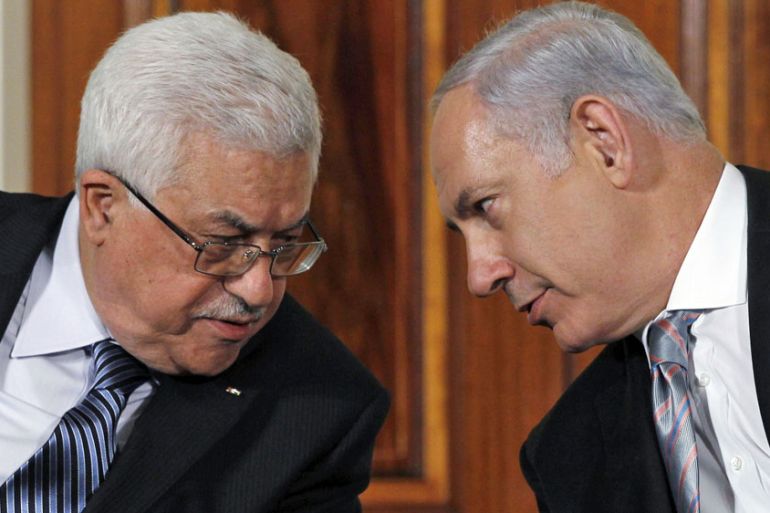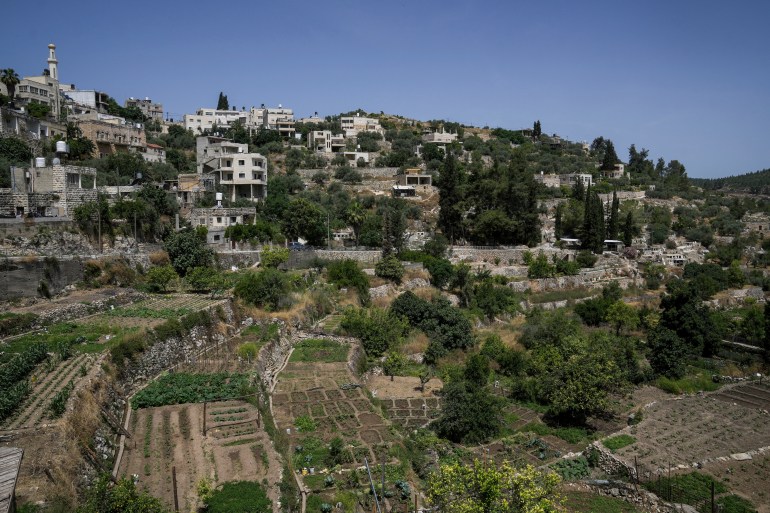What is Israel’s end game with the Palestinian Authority?
The Israeli army carried out a raid metres away from the Palestinian Authority’s headquarters in Ramallah last week.

Ramallah, occupied West Bank – At dawn on December 8, the sound of gunshots rang out above al-Manara Square, the central roundabout in Ramallah in the Israeli-occupied West Bank.
Dozens of Israeli armoured vehicles had raided the area, less than a kilometre (0.6 miles) away from the Palestinian Authority’s (PA’s) headquarters to go into a print shop and shut it down. They plastered a poster outside that read: “This shop supports terrorism.”
Keep reading
list of 3 itemsFor the love of Gaza: How content creators are documenting the war
Applause at UN as General Assembly votes to back Gaza ceasefire
The PA keeps a tight noose on any armed resistance in Ramallah, so it was a surprise when the raid was met with live ammunition by Palestinian fighters, leading to an exchange of fire.
The last exchange of fire at al-Manara Square had been in 2006, according to local journalists.
Israeli forces raided Ramallah again over the next two days, and analysts told Al Jazeera that the raids, which happen daily in the occupied West Bank, have taken greater significance recently.
“It is a show of power and a provocation to the PA and the people to instil fear,” Ismat Mansour, a Ramallah-based analyst, told Al Jazeera.
“If we tie these actions with [Israeli Prime Minister] Netanyahu and [Finance Minister Bezalel] Smotrich’s recent statements, which are full of incitement and animosity against the PA, … we see that their goal is to embarrass the PA and to weaken it even more.
“There is no security pretext for raiding Ramallah and carrying out an exchange of fire in the centre of al-Manara, metres away from the Muqataa [PA headquarters] only to close a print shop.”
Netanyahu charged on Monday that the PA aims to “destroy Israel in stages” although it is not clear what he was basing the accusation on.
“The difference between Hamas and the PA is only that Hamas wants to destroy us here and now – the PA wants to do it in stages,” he said in a closed-door meeting of the Knesset’s Foreign Affairs and Defense Committee, according to Israeli media.

On October 7, fighters belonging to Hamas, the group that rules the Gaza Strip, launched attacks on Israeli territory during which about 1,200 people were killed and 200 captured and taken to Gaza.
Israel immediately launched a retaliatory assault on Gaza that has killed nearly 19,000 Palestinians, including more than 7,700 children.
Post-war phase
With the Israeli war on Gaza extending into its third month, Israeli, American and other foreign officials have been publicly discussing what the political leadership in the strip will look like after the war, based on the premise that Israel will destroy Hamas.
In recent weeks, United States officials suggested the PA rule over the Gaza Strip, but many observers do not think that is likely and top Israeli officials have opposed the idea.
US President Joe Biden’s administration said it does not support an indefinite Israeli military presence in the territory, and it opposes downsizing Gaza or displacing its population.
In early November, Abbas said the PA’s return to Gaza would depend on a “political solution” being reached, one that would include the establishment of a Palestinian state within the 1967 borders with East Jerusalem as its capital.
However, the Authority is problematic, as is Abbas as its head, given his advanced age and the fact that there have been no elections to select the PA leadership for nearly two decades.
Abdeljawad Hamayel, an academic at Birzeit University, believes it is too early to know what the post-war phase will look like.
“We’re still in the midst of the war. It is important to note that until this moment, Israel has not successfully dismantled the military infrastructure of resistance in the Gaza Strip, which means that we cannot talk about the day after at this point,” Hamayel told Al Jazeera.
So far, Israeli officials have hinted at a long-term plan that includes shifting to low-intensity warfare. Such a situation, Hamayel said, would allow Israel to “maintain a military presence in the Gaza Strip while conducting operations deep within it”.

That, he said, would permit them to “act freely or with little resistance to arrests or killings of Palestinian civilians and resistance fighters over months or even years”.
Is the PA’s existence in Israel’s interest?
The PA was created under the 1993 Oslo Accords between the Palestine Liberation Organisation (PLO) and Israel. It was formed as an interim, five-year governing body meant to lead to an independent Palestinian state in the occupied territory of East Jerusalem, the West Bank and the Gaza Strip.
However, 30 years into its existence, the PA has failed to create a state in the face of Israeli occupation and restrictions, illegal land grabs and settlements. And in 2007, it lost control of Gaza to Hamas.
Many living under the PA in the West Bank described it as a subcontractor for the Israeli occupation. Under the Oslo Accords, the PA is required to share intelligence with Israel as part of its highly criticised policy of “security coordination” and to help thwart armed resistance by Palestinians, including by helping with arrests.
While the PA acts as a buffer between the three million Palestinians in the West Bank and the Israeli military occupation, analysts said Netanyahu’s right-wing government, which came to power in December 2022, has been pushing for the dissolution of the PA.
“It is definitely in the interest of the Israeli army and security apparatus that the PA remain intact. It is something strategic for them,” Mansour said. “But the right wing in Israel and the direction they are taking is the weakening of the PA to the maximum amount possible.”
Hamayel agreed. “They see it as something that they want to get rid of,” he said.
“Many of those in Netanyahu’s government don’t want to see a PA governing the Palestinian people, even if this authority cooperates with the Israelis and provides the ground for the continuation of the settlement project without significant resistance from Palestinians in the West Bank,” he continued.
For Hamayel, if the PA were to take hold of Gaza, that would mean the potential unification of the territories Israel occupied in 1967, which places pressure on Israel, the US and Europe to engage in serious negotiations on the possibility of a two-state solution.
Such a nation would require Israel to withdraw its hundreds of illegal settlements across the occupied West Bank and East Jerusalem, where at least 700,000 Israelis live in fortified compounds, the majority of which have been built either fully or partially on private Palestinian land.

“Netanyahu hopes to make this fail,” Hamayel said, explaining that the Israeli prime minister is “signalling to his right-wing base that they should support him because he will be a guarantor that the settlement project in the WB will continue unbridled and to block diplomacy or negotiations with the PA leadership.”
Declining popularity
The PA’s popularity has dwindled over the past decade, particularly because of a longstanding financial crisis that has only worsened with the war on Gaza and the violent repression of critical voices.
Calls for Abbas to step down increased after protests in June 2021 against the killing of outspoken critic Nizar Banat by PA security services, a rise in settler attacks and the latest Israeli assault on Gaza.
On October 17, during widespread protests in the occupied West Bank against the Israeli bombing of al-Ahli Hospital in Gaza City in which hundreds of Palestinians were killed, PA security forces shot dead a 12-year-old girl in Jenin.
The lack of a political solution as Israel intensifies its violent military occupation and illegal settlements grow has spurred the re-emergence of Palestinian armed resistance, particularly in the northern West Bank cities of Jenin, Nablus and Tulkarem.
Hamayel said daily Israeli military raids, including those on Ramallah, “are nothing new”. What is new, he says, is the increase in armed confrontations between resistance fighters and the Israeli military.
“This phenomenon is not the product of incursions into Ramallah. I don’t think the Palestinian population has any significant attachment to the PA as a national representative,” Hamayel continued.
Instead, he said: “It’s a long process of disappointment about how the PA manages its relationship with Israel and how it failed to accomplish any of its stated goals of establishing a Palestinian state and how it sustained security cooperation with Israel despite Israeli belligerence in the West Bank and Gaza Strip.”
Not to mention, he added “its failure to support and back the people of Gaza and the resistance in Gaza at this critical junction”.